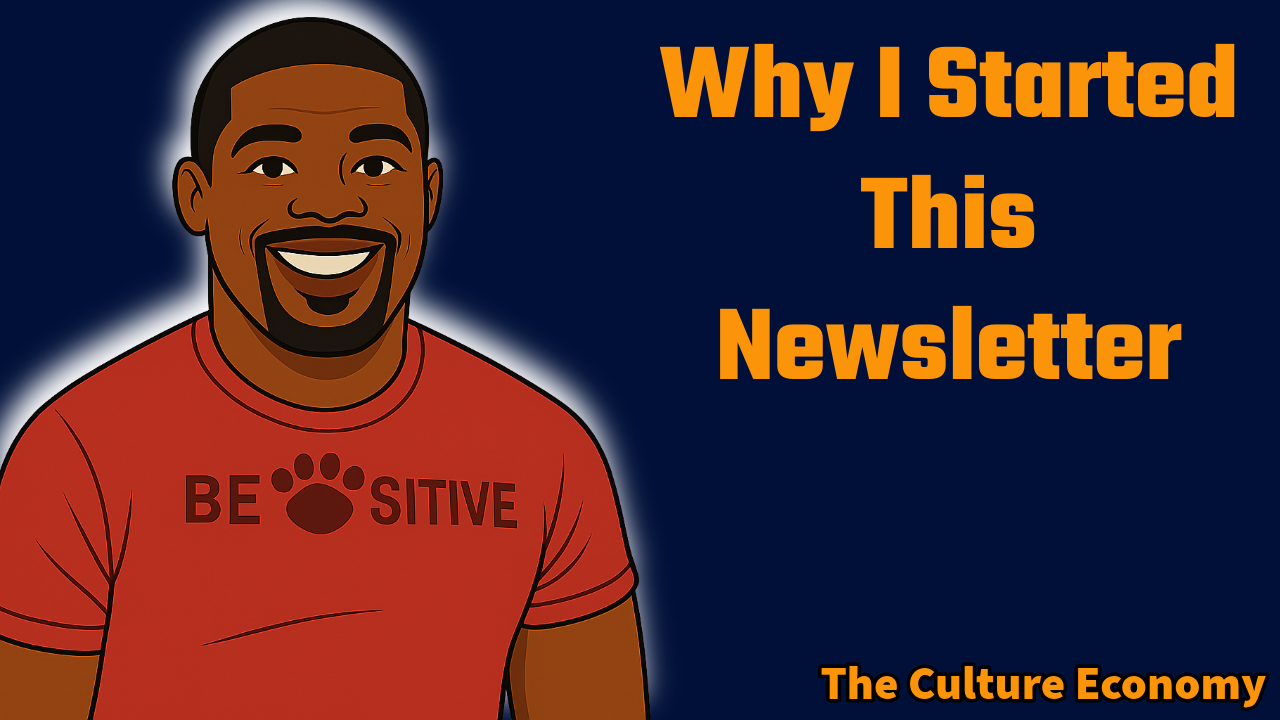Recently, a lot of people have asked me why I started The Culture Economy. When asked in real-time, I usually respond with some form of:
- I shut down my startup and needed something to do
- I’ve always been a creator at heart, and I’m restarting
- Writing is a creative outlet that I’ve long missed
- I need a new job!
And true—it makes for an easy answer over drinks or a 30-minute Zoom call; however, the reality is much deeper than that. So in today’s newsletter, we discuss the real reasons and why this matters to every Black creator.
Let’s get this started!
The Cultural Dismissal
The Best Man came out in 1999. I was 15 at the time, and somehow, with my best friend, we snuck into a movie theater to watch the rated-R movie. This was likely on a weekday, during business hours, on the outskirts of Austin, where if you showed up and paid for a movie ticket, a theater owner looking for business wasn’t asking you any questions—nevermind ones about your age.
Everyone I knew loved that movie. My Black best friend. My Black classmates. My family. My neighborhood. It was ours. It starred rising Black actors, had heart, had style, and told a story we often didn’t get to see.
It punched well above its weight, earning $34M on a $9M budget. But because the creator didn’t own the IP—or the audience—that success disappeared into the ether. We didn’t get a sequel for 14 years.
When The Best Man Holiday finally arrived in 2013, it got a modest $17M budget, and again, outperformed with $72M!
And yet again, we waited.
It took another 9 years for a follow-up: a limited series in 2023 that became Peacock’s first original to crack the weekly Top 10 Nielsen Streaming Ratings.
Black audiences showed up. Again and again. But the system never chose to invest in us—at least not with the consistency or urgency we deserve.
Universal Pictures owns one of the most consistent, culture-backed original IPs in modern media. And still, the investments have been slow, small, and intermittent.
Why?
Because culturally resonant Black IP is rarely valued in proportion to its performance.
The Cultural Theft
Worse than being undervalued is being uncredited.
Enter Jalaiah Harmon.
In 2019, she was a 14-year-old with a background in hip-hop, ballet, jazz, and tap. She choreographed a dance, posted it to Instagram, and hoped it would make waves. It got 13,000 views. Solid traction.
Then someone reposted the dance to TikTok. It caught fire.
But no credit for Harmon.
Soon, Charli D’Amelio—then with ~25M followers—posted herself doing the dance. It went mega-viral. The video (and TikTok) surged in cultural relevance.
Harmon’s name was never mentioned.
And so the pattern repeated: Black creativity fuels the machine. Non-Black faces benefit. Platforms scale. Credit disappears.
The Cultural Reality
Those two stories aren’t rare. They’re systemic.
We are the culture. But we are not equally participating in its rewards.
And the facts back it up:
- Black lifestyle creators drive 10x the value of other creators (GroupBlack)
- But Black creators earn 34% less than white creators with similar reach
- In 2020, TikTok deprioritized posts using #BlackLivesMatter
- Countless examples of Black content being suppressed algorithmically
- At a creator diversity panel, the Black woman was ignored for 25 minutes
- At a creator investment summit, 3 of the 90 attendees were Black
Simply put: Black creators aren’t getting their due.
The Culture Economy Is Here to Change That
The Culture Economy (TCE) exists because Black creators deserve more than applause. We deserve systems that are there for us.
We are not the first to say this. We stand on the shoulders of those who have hosted conferences, written the checks, fought for attribution, and built community from scratch.
Our approach?
Make this a creator business school, a cultural strategy lab, and a blueprint for ownership in the creator economy.
Here’s how we’re building with you:
✅ Actionable strategy, not just encouragement We’re not here to hype. I mean, I’m Black, so we’ll do a little bit of that. But chiefly, we’re here to help you build a repeatable system, one rooted in tentpole events, owned audiences, and monetizable reach.
✅ Frameworks for turning visibility into value We break down how to turn attention into audience, audience into community, community into revenue, and revenue into ownership or long-term equity.
✅ Collaborative infrastructure We’ll make it easier for Black creators to see, connect, and syndicate with one another. Because isolation kills growth, and culture travels faster when it moves together.
✅ Tailored content that gets specific Forget repackaged advice built for creators with different realities. We speak directly to the unique opportunities and challenges of the Black creator economy.
What We’re Up Against and What We’re Building
We’re working against a system that:
- Pays Black creators less
- Suppresses their reach
- Steals their content
- Starves them of capital
- Amplifies others, effectively under-amplifying them
But at TCE, we’re building one that:
- Centers ownership in your creator strategy
- Elevates cultural IP into business assets
- Makes collaboration a growth engine
- Turns momentary visibility into lasting infrastructure
What You’ll Find Here
As you’ve already seen to some degree, you can expect:
- Long reads about virality, growth, revenue, and ownership
- Breakdowns of effective strategies (from large & niche Black creators)
- Graphics and visuals to make it digestible, fun, and always empowering
Through this, we hope to turn the Black creator economy into an actual economy.
And an actual economy requires inputs and outputs.
Culture has always been our input. Now it’s time to own the output.
The Culture Economy is here to help you claim what’s yours.
